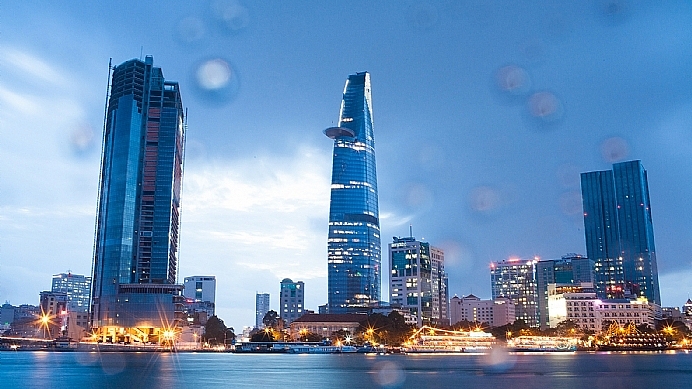Indirect investment aims at Vietnamese real estate
 |
| Indirect investment aims at Vietnamese real estate, illustration photo - source: internet |
Falling in love with the real estate sector
In addition to its role as the third-largest foreign direct investor in Vietnam, Singapore has reportedly also invested a large sum of money through an indirect route into the country’s real estate sector over the years.
Singaporean investors in the local real estate tend to take over existing projects, partner up with Vietnamese developers, or set up their own investment funds. In 2017, Keppel Land forked out VND845.9 billion ($37.4 million) for an additional 16 per cent stake in Saigon Centre, upping its shares among the joint ventures connected to the mixed-use complex. The property arm of Keppel Group has also recently bought two residential projects in Ho Chi Minh City at a price of $300 million, as well as buying bonds from Nam Long Group.
Meanwhile, CapitaLand reportedly launched a $130 million fund in Vietnam, aiming to invest in Grade A office buildings around the country. A year earlier, the Singaporean developer set up a similar $300 million fund for Vietnam-based properties.
Another Singaporean investor Frasers Property Ltd. also announced its intention to buy 75 per cent of Phu An Khang Real Estate JSC, equivalent to $18 million.
The largest transaction, however, was Singapore’s sovereign wealth fund GIC Private Ltd. backing one of the country’s leading residential developers Vinhomes with $1.3 billion in May this year.
According to Su Ngoc Khuong, investment director at Savills Vietnam, Singaporean interest in Vietnamese properties is part of a pan-Asian trend.
Growing interest in other sectors
Real estate is not the only sector in Vietnam that woos Singaporean indirect investments. The city state’s investors have been attracted by large-scale Vietnamese companies in the consumer goods and retail sectors.
GIC has broadened its foothold in the Vietnamese market through a slew of holdings. As of May 2018, it was estimated that the Vietnam-based portfolio of GIC stood at VND15 trillion ($663.7 million), making it one of the largest investment funds in Vietnam.
Yeu Huan Lai, Singapore-based senior manager at Nikko Asset Management, told VIR that investment funds in Singapore are drawn in by Vietnam’s quick economic growth, improving livelihoods, and stronger demand for consumption.
“It’s good to see improvements in the sale of state-owned enterprises (SOEs) in Vietnam,” said Lai. “Many SOEs, as well as private corporations, are taking investor relations more seriously, with some of the most recent share sales in Vietnam close to international standards already.” The portfolio manager stated that he is “positive we will see continued interest in Vietnam for the foreseeable future”.
The interest is extending to Vietnamese startups in all stages of development, with venture capital funds pouring money into various platforms. Venture funds in Singapore, considered the “Silicon Valley of Southeast Asia”, are seeking to pour between $500,000 and $1 million into supporting Vietnamese startups.
The road to finance and banking
Despite its attractiveness to other markets, Singaporean investors seem to have ignored Vietnam’s finance and banking sector.
Economist Nguyen Tri Hieu commented that Singaporean banks may feel concerned about the foreign ownership limit, now set at 30 per cent for all investors and 20 per cent for a strategic investor in a Vietnamese bank. Other issues, including bad debts, corporate governance, credit ranking, and Basel II compliance, may have also deterred Singaporean investors.
Nguyen Thuy Duong, deputy managing director of Financial Services at EY Vietnam, noted that Vietnamese banks score very low on the ASEAN Corporate Governance Scorecard, which is the standard used by all major financial institutions in Singapore, Malaysia, and other countries.
“The Vietnamese banking system is seeing some remarkable improvements in recent years, especially in terms of risk management,” said Duong. “However, these are not enough to entice foreign investors.”
Taking a detour
Capital flow coming from Singapore may appear to be sourced from Singapore-based businesses, but can come from other countries too. The Singapore-based business then becomes a tool for the transaction or, at most, a partner in the exchange.
This can be witnessed in the case of Vinamilk. At first glance, it appears as if two Singaporean entities, Fraser and Neave (F&N) and Jardine C&C, are battling for ownership of Vietnam’s top dairy company. However, upon closer inspection, it becomes clear that F&N is an affiliate of Thai Beverage, while Jardine C&C is a subsidiary of Jardine Matheson, a powerful conglomerate from Hong Kong.
“We believe that ThaiBev will rely on F&N as its regional expansion vehicle,” said Andy Sim, lead analyst at DBS Vickers Securities.
At its 2018 annual shareholders’ meeting, ThaiBev confirmed that it is collaborating on various operations with F&N. Alongside using the Singaporean entity for regional deals, ThaiBev recently nominated key executives from F&N, both Singaporean, to lead Vietnam’s leading brewer Sabeco.
What the stars mean:
★ Poor ★ ★ Promising ★★★ Good ★★★★ Very good ★★★★★ Exceptional
 Tag:
Tag:
Related Contents
Latest News
More News
- NAB Innovation Centre underscores Vietnam’s appeal for tech investment (January 30, 2026 | 11:16)
- Vietnam moves towards market-based fuel management with E10 rollout (January 30, 2026 | 11:10)
- Vietnam startup funding enters a period of capital reset (January 30, 2026 | 11:06)
- Vietnam strengthens public debt management with World Bank and IMF (January 30, 2026 | 11:00)
- PM inspects APEC 2027 project progress in An Giang province (January 29, 2026 | 09:00)
- Vietnam among the world’s top 15 trading nations (January 28, 2026 | 17:12)
- Vietnam accelerates preparations for arbitration centre linked to new financial hub (January 28, 2026 | 17:09)
- Vietnam's IPO market on recovery trajectory (January 28, 2026 | 17:04)
- Digital economy takes centre stage in Vietnam’s new growth model (January 28, 2026 | 11:43)
- EU Council president to visit Vietnam amid partnership upgrade (January 28, 2026 | 11:00)






















 Mobile Version
Mobile Version